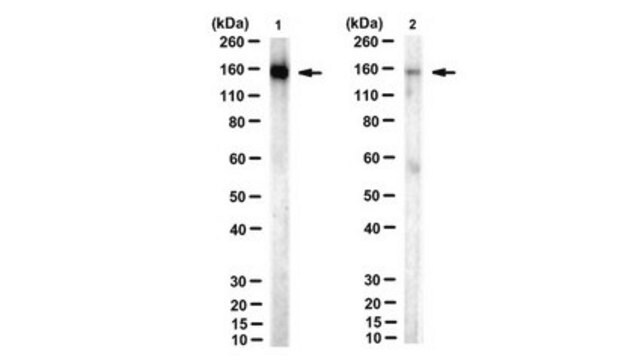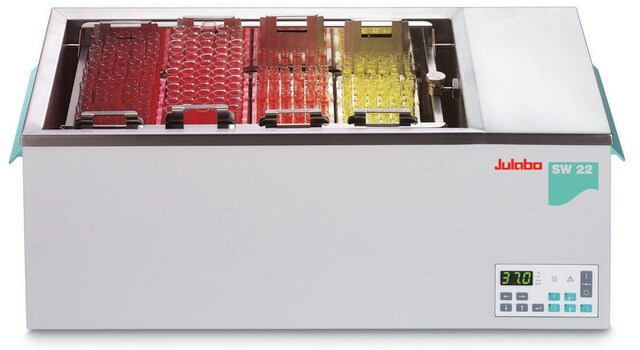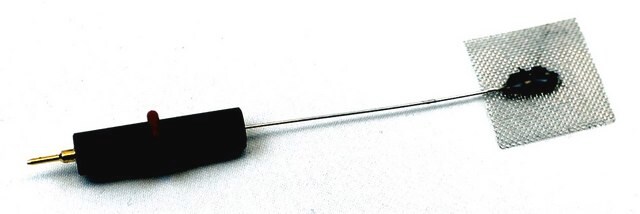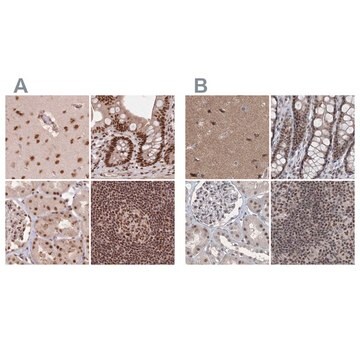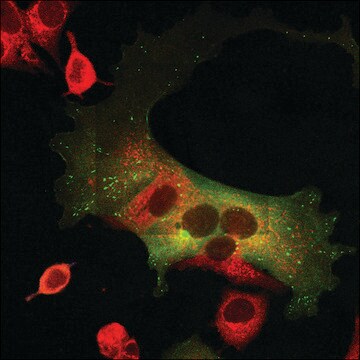Especificidad
Clone 209f/A7 is a mouse monoclonal antibody that specifically targets Structural maintenance of chromosomes protein 3 (SMC3). It targets acetylated Lysines 105 and 106.
Inmunógeno
KLH-conjugated linear peptide corresponding to 19 amino acids surrounding acetylated lysine 105 and 106 from the N-terminal region of human Structural maintenance of chromosomes protein 3 (SMC3).
Aplicación
Quality Control Testingvaluated by Western Blotting in HeLa S3 cells treated with Esco1 and Esco2.Western Blotting Analysis: A 1:1,000 dilution of this antibody detected acetyl SMC3 (Lys105/106) in HeLa S3 cells treated with with Esco1 and Esco2, but not in cells treated with siRNA oligos.Tested ApplicationsWestern Blotting Analysis: A representative lot detected acetyl SMC3 (Lys105/106) in Western Blotting applications (Nishiyama, T., et. al. (2010). Cell. 143(5):737-49; Deardorff, M.A., et. al. (2012). Nature. 489(7415):313-7; Minamino, M., et. al. (2015). Curr Biol. 25(13):1694-706; Dasgupta, T., et. al. (2016). J Biol Chem. 291(24):12761-70; Srinivasan, M., et. al. (2018). Cell. 173(6):1508-1519).Immunofluorescence Analysis: A representative lot detected acetyl SMC3 (Lys105/106) in Immunofluorescence applications (Dasgupta, T., et. al. (2016). J Biol Chem. 291(24):12761-70).ChIP-seq Analysis: A representative lot detected acetyl SMC3 (Lys105/106) in ChIP-seq applications (Srinivasan, M., et. al. (2018). Cell. 173(6):1508-1519; Hill, L., et. al. (2020). Nature. 584(7819):142-147).Note: Actual optimal working dilutions must be determined by end user as specimens, and experimental conditions may vary with the end user
Anti-acetyl SMC3 (Lys105/106), clone 209f/A7, Cat. No. MABE1925, is a mouse monoclonal antibody that detects acetylated Structural maintenance of chromosomes protein 3 (SMC3) and is tested for use in ChIP-seq, Immunofluorescence, and Western Blotting.
Descripción de destino
Structural maintenance of chromosomes protein 3 (UniProt: Q9UQE7; also known as SMC protein 3, SMC-3, Basement membrane-associated chondroitin proteoglycan, Bamacan, Chondroitin sulfate proteoglycan 6, Chromosome-associated polypeptide, hCAP) is encoded by the SMC3 (also known as BAM, BMH, CSPG6, SMC3L1) gene (Gene ID: 9126) in human. SMC-3 is a central component of cohesion, a complex required for chromosome cohesion during the cell cycle. Cohesin complexes are composed of the SMC1 and SMC3 heterodimer attached via their SMC hinge domain, RAD21 which link them, and a STAG protein, which interacts with RAD21. Human SMC3 is reported to be acetylated by ESCO1 and ESCO2. Acetylation of SMC3 at lysine 105 and 106 by ESCO1 is important for genomic stability and S phase sister chromatid cohesion. ESCO1 is reported to require precocious dissociation of sisters protein 5 (Pds5), a cohesion regulatory subunit bound to RAD21, to acetylate SMC3 and stabilize chromatin. However, ESCO2 function is not affected by Pds5. Although total SMC3 levels remain stable during cell cycle, acetylated SMC3 declines rapidly during mitosis. The deacetylation of SMC3 is brought about by HDAC8 following anaphase stage. This is important for recycling of cohesin and enables its reloading in interphase for both mitotic and non-mitotic functions. (Ref.: Dasgupta, T., et al. (2016). J. Biol. Chem. 291(24); 12761-12770; Deardorff, MA., et al. (2012). Nature. 489(7415); 313-317; Minamino, M., et al. (2015). Curr. Biol. 25(13); 1694-1706).
Forma física
Purified mouse monoclonal antibody IgG1 in buffer containing 0.1 M Tris-Glycine (pH 7.4), 150 mM NaCl with 0.05% sodium azide.
Almacenamiento y estabilidad
Stable for 1 year at +2°C to +8°C from date of receipt.
Otras notas
Concentration: Please refer to the Certificate of Analysis for the lot-specific concentration.
Cláusula de descargo de responsabilidad
Unless otherwise stated in our catalog or other company documentation accompanying the product(s), our products are intended for research use only and are not to be used for any other purpose, which includes but is not limited to, unauthorized commercial uses, in vitro diagnostic uses, ex vivo or in vivo therapeutic uses or any type of consumption or application to humans or animals.
